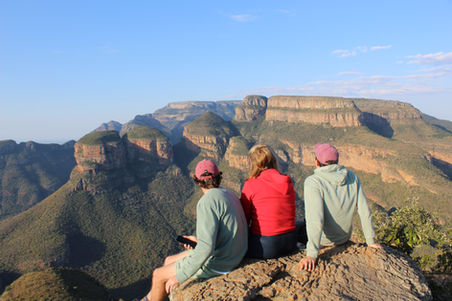
Long-Term | Endangered species volunteer
The projects included in our long-term wildlife volunteer placement focus on protecting endangered species of animal such as cheetah and rhino through a variety of different conservation methods.
Volunteers will be expected to take part in these projects and assist the reserve's Biomonitoring Team, helping achieve a number of goals in terms of monitoring, researching and protecting these animals.
These long-term projects are ideal for anyone considering conservation or zoology as a career and hoping to gain practical experience and real-world knowledge, or anyone looking for an authentic African adventure.
Become a volunteer
Volunteer information


Long-term wildlife volunteer projects
Predator population monitoring
The Big 5 reserve is home to various predatory animals including hyena, lion and Jackal.
You'll use a variety of methods to monitor and observe the reserve's predator population, social dynamics and territorial ranges. You'll look for unusual patterns that could indicate breeding or poor health.
Location of predators, change in populations and mortalities are recorded to aid in the predator-model.
What will you be doing?
-
Radio collar tracking
-
Monitoring animal behaviour
-
Camera trap usage
-
Tracking and plotting animal routes
-
Using ID kits to identify individuals
-
Record kills and mortalities
-
Checking for injuries or illness
-
Recording predators
Plants and vegetation form the basis of any ecosystem. You'll take part in various regular surveys designed to monitor grass species composition, biomass amounts and woody tree monitoring.
All this is essential for habitat management and you'll gain an understanding in how to manage food availability of plants with herbivore population requirements, determine growth rates and how to manage and implement fire breaks.
What will you be doing?
-
Grass species surveying
-
Monitoring biomass
-
Impact of fire on the reserve
-
Species composition
Vegetation surveys


Radio collar tracking
Using GPS and VHF hand-held radio-tracking equipment, you will track and monitor target species from predators to elephants. This is important for monitoring the behaviour of these animals. A fantastic opportunity to get practical experience with an essential tool for any ecologist studying large animals in the wild.
What will you be doing?
-
Tracking movements of wildlife
-
Using VHF radio-tracking equipment
-
Monitoring behaviour of wildlife
-
Checking for injuries or breeding activity
-
Notifying location of species for supplementary feeding if necessary

Veterinary work
Watch and assist local wildlife vets with any duties they need to carry out. This could be routine inoculations, check-ups, responding to emergency callouts or capturing species for translocation.
What will you be doing?
-
Attend emergency callouts
-
Monitor sick or injured animals before and after treatments
-
Routine inoculations
-
Performing check-ups
-
Learning about veterinary work
-
Assist in capturing species selected for translocation to other reserves
Camera trap surveying
Help place camera traps dependant on different goals, objectives and target species. Analyse our findings and help record the data and plotting the animals habits to gain a better understanding of their movements, population and social dynamics.
What you'll be doing
-
Planning placement of camera traps
-
Placing and installing camera traps
-
Recording and plotting data
-
Analysing recorded data
-
Change batteries and memory cards

Rhino monitoring
Identify unique markings and characteristics on rhino via resources in a field identikit. Help record data relating to animal ID, location, social groups, health, behaviour and more all to be used later by ecologists and reserve managers to help maintain the population.
What you'll be doing
-
Tracking and observing rhino
-
Inputting data into databases
-
Monitoring behaviour during sighting
-
Recording individuals, groupings, new births, and body condition

Game transects
A transect is a set route that ecologists and spotters travel along recording animals seen. This data is able to be used to estimate levels of populations, herd locations, structure and over all helps planning and management of animal populations.
What you'll be doing
-
Spotting and counting animals during transect
-
Inputting data into databases
-
Monitoring population health
-
Observing behaviour of herds
-
Recording herd structure (age and sex)
-
Recording body condition

Track and sign
On foot with your guides and fellow volunteers, you will explore the bush and attempt to uncover which animals have been active in the area. You will look for signs from footprints or dung, and for more subtle clues such as rubbing marks on trees. You may potentially follow the trail to try and physically locate the animals responsible.
What will you be doing?
-
Searching for tracks and signs of animal activity
-
Recording any unusual tracks or signs
-
Attempting to locate rare or endangered animals.

Game drives
Monitoring the populations and behaviour of larger species such as antelope and lion is usually done through visual means. This generally means patrolling in a vehicle and recording crucial data such as the apparent health of the animals, breeding status and behavioural habits.
This allows us to observe any unusual or concerning behaviour, possibly indicating injury or disease. We can then help minimise problems before they develop, or become aware of new developments in breeding success.
What will you be doing?
-
Monitoring behaviour of species
-
Monitoring breeding status
-
Checking for signs of disease
-
Learning about animal behaviour

























